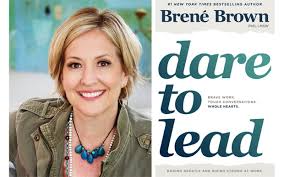
Brene Brown is a renowned academic, author, speaker and more. Recently, a few thousand of my friends and I crowded into the Melbourne Exhibition Centre to hear her speak.
The future she says – belongs to the curious. And to the brave.
Her latest book Dare to Lead cites substantial research on the future of leadership. And, critically, what stands in the way.
What stands in the way becomes the way – Marcus Aurelius
What’s getting in the way of leadership
Avoiding tough conversations
First and foremost, the ducking and weaving that goes with avoiding tough conversations.
Brene asked the audience to reflect if every person there had one conversation that they had been avoiding, how their organisations would be transformed overnight.
She defines a tough conversation as “saying something that is honest in a way that the person can hear you.”
In her book (2018, p.8) she notes that the consequence to this behaviour is:
- Lack of clarity;
- Diminished trusted engagement;
- An increase in problematic behaviour including passive aggressive behaviour, talking behind people’s backs and pervasive back channel communication (or the meeting after the meeting), gossip and the dirty yes (where I say yes to your face and no behind your back).
It doesn’t take much effort to think of examples of these sorts of behaviours, where leaders either avoid or outsource the conversation.
Rather than spend a reasonable amount of time addressing fears and concerns …
Leaders avoid the fears and concerns that arise during period of immense change and then spend an unreasonable amount of time addressing the problematic behaviour that always follows.
Brene says “we don’t peel the onion to look at what is driving the behaviour”.
Reset
It is easier to be brave if you know how to get back up after failure. Too many leaders are not in charge of their own bounce back and reset. Brene says it is a tool we can teach and one that we need to.
Too much shame and blame
If employees come to expect ridicule and being put down when they arise a new idea, the organisation condemns itself to group think and the status quo. And where there is shame and blame, there’s not accountability and learning.
Too much time spent on the solving the problem
Not enough time spent on identifying why the problem arose in the first place.
Opting out of the difficult conversations on diversity and inclusivity and equity
Better to say nothing than to say the wrong thing, leaders fear!
Brene says that choosing our own comfort over hard conversations is the epitome of privilege, which erodes trust moves away from possible meaningful change.
SOME THINGS TO PONDER
- Look at the list above and see if there is just one thing there that you can start to work on. Make a commitment to yourself and share with your team what you would like to be different.
- If you want to look at tough conversations there are plenty of different models to assist. Radical Candour is one popular model, but there are plenty more.
- Think about the cost to your team and the organisation in not addressing these behaviours.
- If that’s not enough, then think about what might this cost your leadership
career going forward?
WANT MORE?
- Listen: How to be your most courageous self – a podcast
- Read: Why Performance Improvement Just Doesn’t Work
- Download: Dare to Lead Downloads
- Watch: the Netflix special: The Call To Courage
AND MORE STILL ?
If the above has whetted your appetite, and you’re keen for more.. Here are some ideas:
Does leadership interest you? You can sign up to my FREE seven day “Be a Better Boss Challenge” by clicking here. And you can click here to buy my book.
Want to chat? Click here to get in touch.
Want some help in meeting your goals for the new financial year? Sign up to the permission to dream programme, by clicking here.
Want more to read? You can read any of the 300+ blog posts on this site, by clicking here. And if you’d like to read posts specifically on leadership, you can click here.
See you soon,

With thanks to Brene Brown for the quoting of her book.

